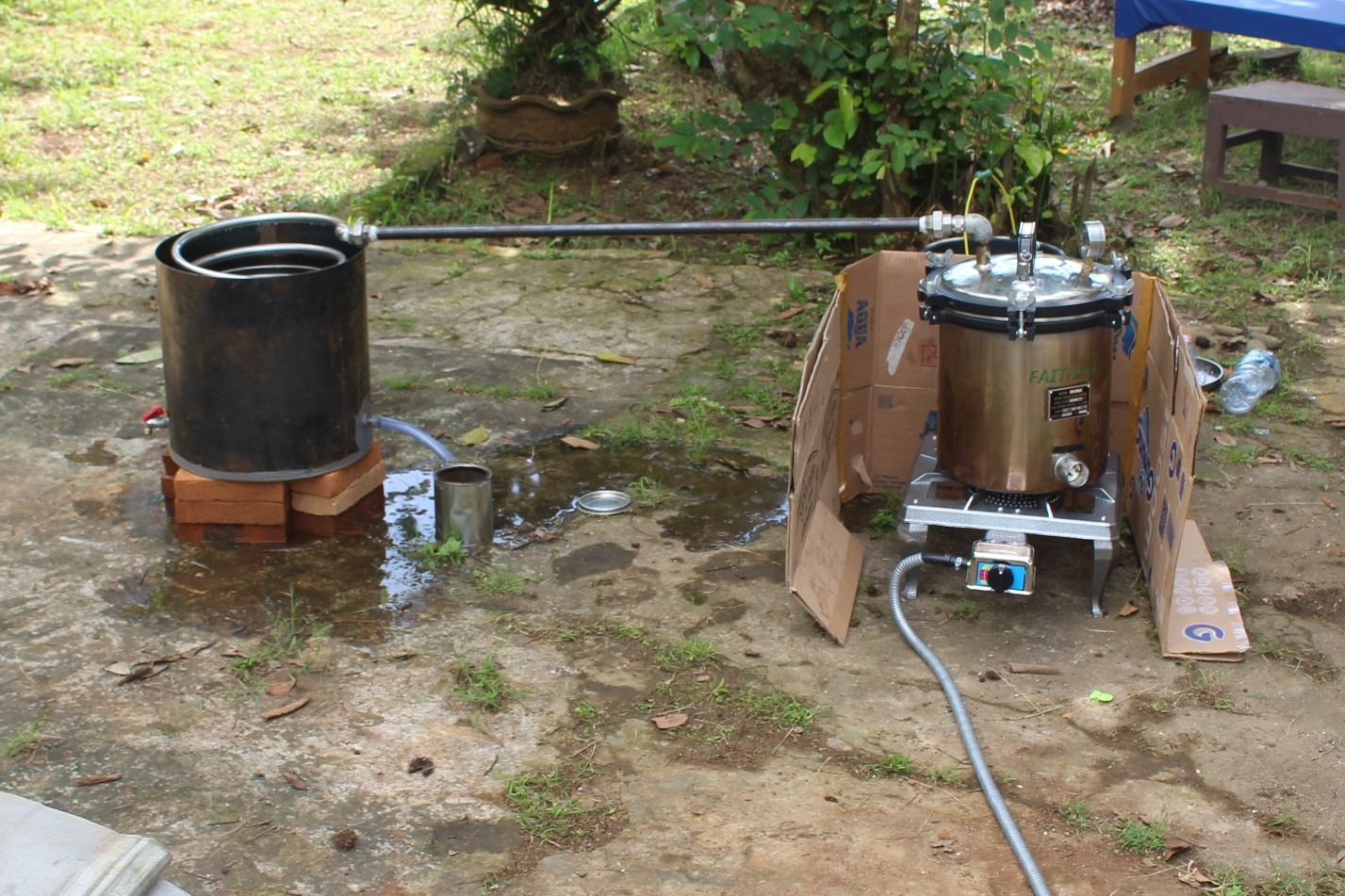ITS Students Develop Plastic Recycling Equipment Into Fuel

The ITS Fuchelia Team and the results of pyrolysis oil products when participating in a community service event organized by Karya Salemba Empat (KSE) with the title Technology For Indonesia (TFI) in Serang, Banten
ITS Campus, ITS News – One of the solutions to overcome the problem of plastic waste is to use pyrolysis techniques to recycle waste into fuel. Through this focus, the Fuchelia Team from the Institut Teknologi Sepuluh Nopember (ITS) is developing an effective idea through an innovative tool called the Smart Reducer Gas Pyrolysis.
A member of the Fuchelia Team, Immanuel Nathanael Lumban Gaol explained, along with the development of the agricultural industry, currently fossil fuels are still the main choice for several farmers. Meanwhile, its availability is dwindling so it has an impact on expensive prices. “With that, it is necessary to have environmentally friendly fuels, such as fuel produced by pyrolysis of plastic waste,” he said.
Based on these problems, the team involving seven ITS Chemistry Department students designed an appropriate technology using waste pyrolysis techniques. The tool designed is a technology for converting plastic waste into fuel oil which is composed of several parts, namely an 18-liter reactor, connecting pipe, condenser, and product container.
The young man who is familiarly called Nuel explained, the pyrolysis concept he applied was a process of heating solid materials in limited or even no oxygen. “The tool we have developed uses Polyethylene Terephthalate (PET) plastic as a raw material with oil as the outer product,” he added.

The Smart Reducer Gas Pyrolysis designed by the ITS Fuchelia Team is composed of several parts, namely an 18-liter reactor, connecting pipe, condenser, and product container to convert recycled plastic into fuel
Meanwhile, from a technical point of view, he continued, the workings of the Smart Reducer Gas Pyrolysis start with sorting and separating the plastic waste to be chopped until the smallest size is obtained. Followed by a pyrolysis process by inserting 5-10 kilograms of plastic into the reactor, and heating using Liquefied Petroleum Gas (LPG). “Then, the plastic will melt and undergo a process of cracking into shorter chain hydrocarbons,” he explained.
With the heat added continuously in the reactor, the melted plastic evaporates. Steam resulting from heating will flow to the condenser to be cooled so that a liquid in the form of oil is obtained. “This pyrolysis oil is used to fuel diesel engines to power agricultural equipment,” said Nuel.
To reduce carbon emissions, Nuel and the team also added an additive in the form of eucalyptus oil to pyrolysis oil with the target of producing clearer oil. What’s more, active carbon will also be added to the exhaust of diesel engines using pyrolysis oil. “Thus, when using diesel it will not cause a pungent odor,” he said.
Thanks to the idea of appropriate technology from the Smart Reducer Gas Pyrolysis, Nuel, and the team’s design were successfully applied directly to a community service event in Serang, Banten with the theme Technology for Indonesia (TFI). From this process, participants are expected to be able to innovate in various aspects of the agricultural industry in Indonesia, such as energy, pre-harvest, and post-harvest agriculture to solve problems that exist around the community. (ITS Public Relation)
Reporter: Tyara Novia Andhin
Redaktur: Fauzan Fakhrizal Azmi
Related News
-
The Indonesian Minister of Creative Economy Visits GRIT ITS to Review Creative Economy Development
ITS Campus, ITS News — The Sepuluh Nopember Institute of Technology (ITS) continues to demonstrate its commitment to bridging research and innovation,
May 03, 2023 11:05 -
AHY Ignites ITS Freshmen’s Spirit to Achieve Golden Indonesia 2045
ITS Campus, ITS News — Greeted with thunderous enthusiasm, the Coordinating Minister for Infrastructure and Regional Development of the Republic
May 03, 2023 11:05 -
Starting the New Academic Year, ITS Inaugurates 6,993 New Students
ITS Campus, ITS News — Kicking off the 2025/2026 academic year, the Sepuluh Nopember Institute of Technology (ITS) officially inaugurated 6,993 new undergraduate
May 03, 2023 11:05 -
Fira, a frequent student at ITS, is the youngest at 15 years old
ITS Campus, ITS News — At the 2025 New Student Inauguration (PMB) ceremony at the Sepuluh Nopember Institute of Technology (ITS),
May 03, 2023 11:05
